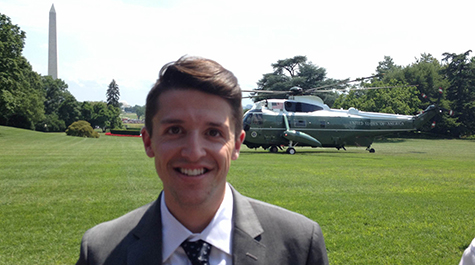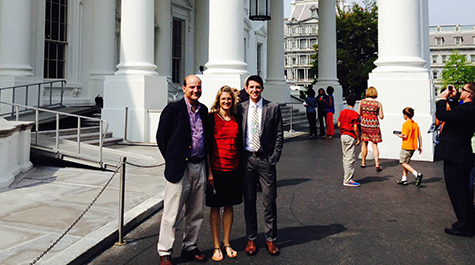VIMS student pursues summer internship at the White House
Irby brings science, policy background to the nation’s capital
Graduate student Isaac (Ike) Irby of the Virginia Institute of Marine Science recently returned from Washington D.C. where he spent his summer working with the nation’s top scientists within the Executive Office of the President’s Office of Science and Technology Policy (OSTP).
Irby, a Ph.D. student in William & Mary’s School of Marine Science at VIMS, was selected for the prestigious internship within the President’s Council of Advisors on Science and Technology (PCAST) housed within OSTP. As a federal advisory committee, PCAST consists of leading scientists and engineers who make policy recommendations to President Obama in areas where understanding science, technology, and innovation is key.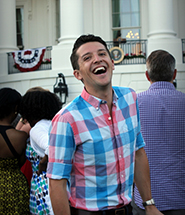
“PCAST is constructed as an avenue for President Obama to gain advice from non-governmental scientists,” says Irby. “The group of 20 exemplary scientists helps strategize what the science agenda should be and what issues the President might want to focus on, as well as topics the President himself tasks the Council to examine.”
Established by Congress in 1976, OSTP provides the President and his senior staff with relevant scientific and technical advice, ensures the policies of the Executive Branch are informed by sound science, and coordinates scientific and technical work to provide the greatest benefit to America.
A graduate of Bowdoin College, Irby came to VIMS in 2012 to pursue his Master’s degree, which he later bypassed to complete his doctorate while simultaneously completing a Master’s of Public Policy at W&M. The joint degree is offered by the College’s Thomas Jefferson Program, which provides students with the intellectual tools needed to improve the quality of policymaking in the United States and abroad.
Irby’s graduate advisor, VIMS Research Associate Professor Marjorie Friedrichs, describes the joint degree program as being extremely demanding, and says Irby has had to juggle a heavy class load on W&M’s campus while keeping up with his classes and modeling research at VIMS. “While the program might not be for everyone, I’m hoping that Ike’s raising awareness at VIMS so that more students will take advantage of this unique opportunity.”
Irby says his motive for enrolling in the joint degree program came from his deep interest in science advisory efforts and the process of science policy. In the future, Irby says he hopes to work in a high-level science advisory role in the United States and internationally, and possibly transition to a science diplomacy position later on.
It’s this same interest in science and policy that led Irby to explore summer internship opportunities in the OSTP, where he received his first glimpse at what it would be like to be a scientific advisor for the President of the United States.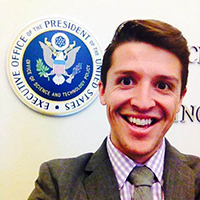
As an intern, Irby helped develop reports to advise President Obama on pertinent issues encompassing all aspects of science and technology. After arriving in the nation’s capitol, Irby put his background in marine science to use right away by helping to put together an oceans panel, which was established to inform PCAST advisors on current pressing issues in ocean science, including ocean acidification, sea-level rise, ocean-observing technologies, and the nation’s dwindling research fleet.
In addition to the oceans panel, Irby says he helped develop reports on issues such as combating antibiotic resistance, enhancing the role of education technology in training the nation’s middle-skill workforce, and the National Nanotechnology Initiative.
As the sole PCAST intern, Irby says he also did significant research on the President’s science recommendations—investigating which ones have been implemented, which ones have not, and why. In doing this, Irby was able to create an online interactive graphic that connects the reports to the sectors that they impact.
Friedrichs says she was thrilled when she first learned Irby had been selected for the internship. “I knew this would be an amazing experience that will help shape his view of government and science policy throughout his future career,” she says.
While he enjoyed his summer in the White House and would jump at the opportunity to work with OSTP again, Irby says his long-term goal is to help developing countries formulate their own ocean policies. “I want to help them realize that the ocean transcends international boundaries, and that we have to work together,” he says.
Irby says he took away several memories—both professionally and personally—from his summer in the White House, including the Fourth of July fireworks display and concert on the White House lawn, and being asked by a secret service officer to fill an empty seat near the front of the room during a Presidential Address.
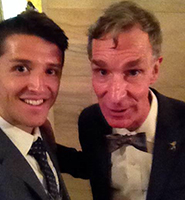 Professionally speaking, Irby says his favorite project from the summer was getting to take part in the first-ever White House Maker Faire. “This event brought in top innovators—young and old—from across the nation to showcase the great things Americans are making using science and technology,” he says. During the event, Irby even managed to snap a quick “selfie” with Bill Nye the Science Guy.
Professionally speaking, Irby says his favorite project from the summer was getting to take part in the first-ever White House Maker Faire. “This event brought in top innovators—young and old—from across the nation to showcase the great things Americans are making using science and technology,” he says. During the event, Irby even managed to snap a quick “selfie” with Bill Nye the Science Guy.
“My time at OSTP reaffirmed my goal of pursuing national and international science advisory after the completion of my degrees,” says Irby. “The opportunity to work at the White House under a President who holds science and technology in such high regard was an incredibly motivating experience that will guide me headlong into future endeavors.”
“Ike’s background in ocean modeling and policy will open so many doors for him after he graduates,” says Friedrichs. “I can’t wait to see what path he chooses.”

